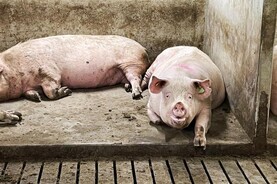Complying with new requirements proposed in the revised Nutrients Action Programme (NAP) would leave the local pig industry unsustainable, a leading expert has said.
At an event in Cookstown on Tuesday organised by the Ulster Farmers’ Union (UFU) and NI Grain Trade Association, former pig scientist Dr Violet Wylie used various calculations to show the problem now facing pig farmers.
On a 300-sow unit finishing its own pigs, it needs 146ha to comply with current NAP rules. Under the proposed changes, that would increase fivefold to 750ha. The key issue is compliance with a new proposed phosphorus (P) balance, starting out at 10kg P/ha in 2027.
If farmers are unable to access land, the main alternative at present is to cut numbers.
“Our annual kill would have to fall from 1.5m to 400,000. That would close Karro and leave Cranswick with 50% capacity. A factory can’t operate at 50%, so in essence the pig industry is gone. It is that serious,” said Wylie.
She pointed out that the pig industry is different to grazing livestock as bigger sow units often rely on contract finishers. Out of 415 pig businesses in NI, industry estimates suggest 221 are contract finishing.
With sow units exporting pigs off the farm, they might be in a position to stay within the proposed rules, but many contract finishers don’t have much land said Wylie.
“Where will they get land? You will be in competition with dairy farmers, layers, etc, and they can pay a lot more. If a contract finisher loses land, it is enough to make the house of cards topple. It is fragile,” she said.
Assumptions
Wylie also highlighted some of the assumptions used in current P balance calculations, pointing out that there is a wide range in research data on P retention levels in pigs.
“It is a battle for down the road, but it is a battle we will have to take on,” she said.
However, gains have already been made in reducing P levels in pig diets, so there is little scope to reduce that any further.
Technology
There are also various technologies that could be used to take P out of pig slurry and the ongoing DAERA funded Sustainable Use of Livestock Slurry (SULS) initiative.
But there are many issues to be worked through, including planning permission, what technologies will be approved etc.
“The immediate thing we need to ask for from DAERA is time,” said Wylie.
Farmers must respond to NAP consultation
Also addressing the event in Cookstown was Jonathan McFerran from DAERA, who outlined the ongoing SULS work.
He accepted that it could take a number of years to get everything in place to be able to mine significant quantities of P out of livestock slurry.
It was put to him that the pig industry will find those solutions, but the current NAP proposals don’t give producers any scope to work those out.
“I hope you will pass that back to the Minister [Andrew Muir],” said one local producer.
“I can carry that back, but it will resonate much stronger in a consultation response from you, rather than a message from me,” responded McFerran.
The UFU is working on a template that farmers can use, but it is important that all responses are unique or they will be treated as one, explained Aileen Lawson from the UFU.






 This is a subscriber-only article
This is a subscriber-only article










SHARING OPTIONS: